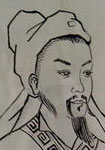
刘辰翁(1233.2.4—1297.2.12),字会孟,别号须溪。庐陵灌溪(今江西省吉安市吉安县梅塘乡小灌村)人。南宋末年著名的爱国诗人。 景定三年(1262)登进士第。他一生一生致力于文学创作和文学批评活动,为后人留下了可贵的丰厚文化遗产,遗著由子刘将孙编为《须溪先生全集》,《宋史·艺文志》著录为一百卷,已佚。 刘辰翁的古诗词
《乳燕飞》是一首宋代刘辰翁创作的诗词,描写了作者在赤壁游玩时的心情和景物。以下是对这首诗词的中文译文、诗意和赏析:
乳燕飞,
Swallows fly,
朝代:宋代,
Dynasty: Song Dynasty,
作者:刘辰翁,
Author: Liu Chenweng,
内容:语参差述之赤壁之游乐。
Content: Describing the joy of visiting the Red Cliff with various expressions.
但古今、风清月白,
But both ancient and modern, the wind is clear and the moon is bright,
更无坡作。
There is no slope.
矫首中洲公何许,
Who is the distinguished person in Zhongzhou,
共我横江孤鹤。
Accompanied by me, a lonely crane crossing the river.
把手笑、孙刘寂寞。
We clasp hands and laugh, Sun and Liu are lonely.
颇有使君如今否,
Is the nobleman still there these days?
看青山、似我多前却。
Looking at the green mountains, it seems like I have been here before.
几见我、伴清酌。
How many times have I seen myself, accompanying a clear drink.
江心旧岂非城郭。
The old center of the river, is it not a city?
抚千年、桑田海水,
Touching the thousand years, the changing sands and sea water,
神游非昨。
The spiritual journey is not just yesterday.
对影三人成六客,
Facing the shadows, three people become six guests,
更倚归舟夜泊。
Leaning on the returning boat, anchoring at night.
尚听得、江城愁角。
Still hearing the melancholic horns of the river city.
渺渺美人兮南浦,
Vague and beautiful woman, on the southern shore,
耿余怀、感泪伤离索。
I am deeply moved and shed tears for the longing.
天正北,绕飞鹊。
In the north, crows fly around.
诗词《乳燕飞》以游览赤壁为背景,通过描述自然景物和表达情感来展现作者的心境。诗中表达了古今风景依旧美丽、自然景物清丽动人的意境,同时也暗示了人事易变,时光流转的主题。作者将自己比作横渡江面的孤鹤,与中洲公一同游览,把手并笑。诗中还探讨了使君的去留,以及对青山、江城的熟悉感。作者表达了自己在江心旧地的感慨,桑田沧海和神游的意象增添了诗的哲理和深度。最后,诗人倚着归舟,依然能听到江城的愁角声,以及对美人和离别的思念之情。
这首诗词通过细腻的描写和抒发情感,展示了作者对自然景色和人事变迁的感慨和思考。同时,诗中运用了自然景物与人情之间的对比,凸显了人类的渺小与时光的无情。整首诗抒发了作者对美的追求和对离别的伤感,展现了诗人细腻的感受力和深邃的思考能力。
rǔ yàn fēi
乳燕飞
yǔ cēn cī shù zhī
语参差述之
chì bì zhī yóu lè.
赤壁之游乐。
dàn gǔ jīn fēng qīng yuè bái, gèng wú pō zuò.
但古今、风清月白,更无坡作。
jiǎo shǒu zhōng zhōu gōng hé xǔ, gòng wǒ héng jiāng gū hè.
矫首中洲公何许,共我横江孤鹤。
bǎ shǒu xiào sūn liú jì mò.
把手笑、孙刘寂寞。
pō yǒu shǐ jūn rú jīn fǒu, kàn qīng shān shì wǒ duō qián què.
颇有使君如今否,看青山、似我多前却。
jǐ jiàn wǒ bàn qīng zhuó.
几见我、伴清酌。
jiāng xīn jiù qǐ fēi chéng guō.
江心旧岂非城郭。
fǔ qiān nián sāng tián hǎi shuǐ, shén yóu fēi zuó.
抚千年、桑田海水,神游非昨。
duì yǐng sān rén chéng liù kè, gèng yǐ guī zhōu yè pō.
对影三人成六客,更倚归舟夜泊。
shàng tīng dé jiāng chéng chóu jiǎo.
尚听得、江城愁角。
miǎo miǎo měi rén xī nán pǔ, gěng yú huái gǎn lèi shāng lí suǒ.
渺渺美人兮南浦,耿余怀、感泪伤离索。
tiān zhèng běi, rào fēi què.
天正北,绕飞鹊。
